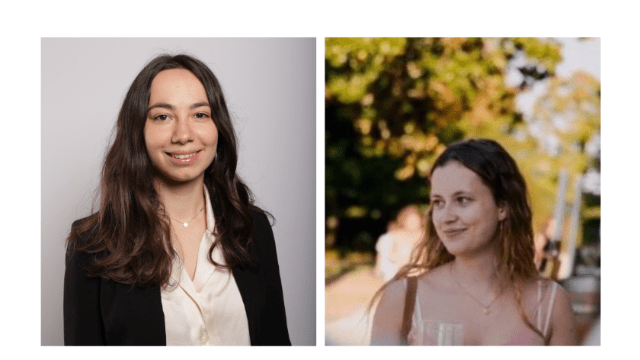A month, not just 1 but 2 committed alumnae!! Amélie LEBIHAIN E(24) & Alexia ROUSSET E(25)
08.07.2024
Amélie LEBIHAIN E(24): "Every level matters to act and have an impact!"
Initially holding a Master's degree in wine and spirits commerce, Amélie sought to broaden her scope by joining the MiM program at ESSEC. She aimed to specialise in climate and biodiversity, which she pursued through the Talents for Ecological Transition Chair. Highly interested in the challenges of the textile industry, she joined Saint Laurent's sustainability department (part of the Kering group) as an apprentice a year ago. She volunteered for the Circular Fashion Federation for six months and then became co-responsible for conference and journalism activities for the association.
Alexia ROUSSET E(25): "Joining forces with many other Alumni!"
An Industrial Engineering graduate from INSA Lyon, Alexia completed her education at ESSEC by participating in the Talents for Ecological Transition Chair. She is currently an apprentice at C-Ways, a strategic consulting firm, where she manages the company's CSR strategy (Carbon Footprint, action plans, Climate Collage, etc.) and supports their clients in their transition pathways.
These two alumnae are inseparable! They have been engaged for two years in ESSEC's sustainable development association, NOISE, which is active on ESSEC's Cergy campus and supported by the ESSEC Sustainable Business Club.
E.S.B.: What is your background, and what made you interested in CSR?
A.L.: "During my academic exchange in Canada while studying engineering, I accidentally took a scientific course on climate change, which sparked my interest. This subject fascinated me, and I started learning independently before training through the Talents for Ecological Transition Chair while continuing my studies at ESSEC."
A.R.: "I was fortunate to grow up with three older sisters who were very committed, which quickly made me question the commercial environment I was in and destined for. At the end of my first master's degree, I couldn't see myself continuing in traditional marketing roles. I wanted to ensure that I dedicated my time to projects heading in the right direction and to contribute, in my small way, to changing traditional business models."
E.S.B.: How does CSR manifest in your daily life?
A.L.: "Once informed, it's hard not to think about CSR daily! I view my commitment mainly through a professional lens, so CSR is an important topic. Beyond CSR, environmental issues are at the core of my concerns. I am fortunate to have met incredibly inspiring people through the chair and NOISE, from whom I learn daily."
A.R.: "It follows me everywhere! I've been an apprentice for over a year at C-Ways, a strategic consulting firm with about thirty employees. The firm has a fairly committed DNA but wasn't initially focused on CSR. I built the company's CSR strategy, which I deployed among all employees. I also support some of our clients, such as ADEME, on environmental impact measures."
A.L. & A.R.: We have also both been involved with NOISE for two years now. This year, we were responsible for the association's conference and journalism department. We aimed to raise awareness among ESSEC students, staff, and Cergy locals about social and environmental issues. We organised six conferences on various topics with the following speakers:
- The Greenwashing Comedy Club
- Fabrice Bonnifet
- Christophe Béchu
- Anne-Catherine Husson-Traoré and Antoine Sire
- Cécile Renouard, Anne-Fleur Goll, and Guénolée de Carmoy
- Frah from Shaka Ponk
This experience was immensely enriching on many levels. Through our interactions with the speakers and association members, we learned a lot, both technically and personally.
E.S.B.: How do you define CSR?
A.L. & A.R.: "We like the definition by Cécile Renouard, economist, philosopher, co-founder, and president of the Campus de la Transition, who defines it as 'the Systemic Responsibility of a Company.' She explains: 'We must stop talking about corporate social and environmental responsibility (CSR) in terms of scattered practices by companies, which still often amount to philanthropic engagement. We must articulate political, economic, financial, social, societal, and environmental issues... And thus make CSR a "systemic responsibility of the company," serving a regenerative and equitable economy.' (1)"
(1) [Source](https://www.lesechos.fr/thema/articles/cecile-renouard-responsables-politiques-et-economiques-doivent-faire-du-plaidoyer-pas-seulement-du-lobbying-1876288)
E.S.B.: What would you like to say to the ESSEC Alumni Club and others?
A.L.: "Every level matters to act and have an impact: at the individual level, in schools, in associations, in companies. SMEs have a big role because even if their carbon footprint may be small, they must set an example and guide their clients, often large companies, towards more sustainable business models!"
A.R.: "At our age and at the end of our studies, it is sometimes difficult not to feel overwhelmed by the challenges that lie ahead. Interactions with committed alumni (and with committed people from all walks of life, by the way) are extremely valuable to me. Beyond helping me build the most holistic view of these issues, they often help to ease my fears a little. I hope to meet as many of you as possible!"

comments0
Please log in to see or add a comment
Suggested Articles



